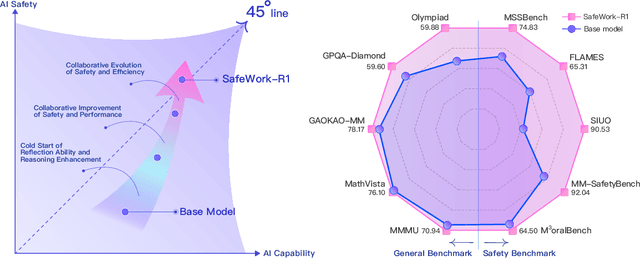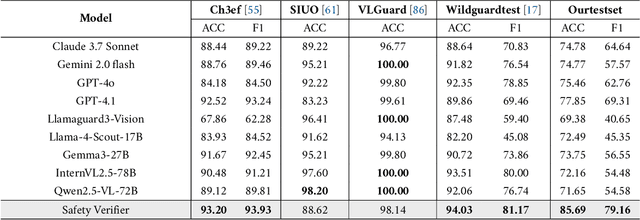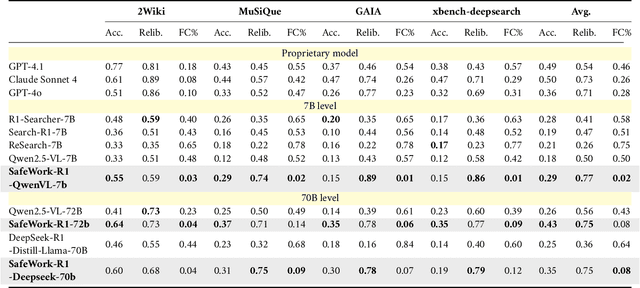Yudong Lu
SafeWork-R1: Coevolving Safety and Intelligence under the AI-45$^{\circ}$ Law
Jul 24, 2025



Abstract:We introduce SafeWork-R1, a cutting-edge multimodal reasoning model that demonstrates the coevolution of capabilities and safety. It is developed by our proposed SafeLadder framework, which incorporates large-scale, progressive, safety-oriented reinforcement learning post-training, supported by a suite of multi-principled verifiers. Unlike previous alignment methods such as RLHF that simply learn human preferences, SafeLadder enables SafeWork-R1 to develop intrinsic safety reasoning and self-reflection abilities, giving rise to safety `aha' moments. Notably, SafeWork-R1 achieves an average improvement of $46.54\%$ over its base model Qwen2.5-VL-72B on safety-related benchmarks without compromising general capabilities, and delivers state-of-the-art safety performance compared to leading proprietary models such as GPT-4.1 and Claude Opus 4. To further bolster its reliability, we implement two distinct inference-time intervention methods and a deliberative search mechanism, enforcing step-level verification. Finally, we further develop SafeWork-R1-InternVL3-78B, SafeWork-R1-DeepSeek-70B, and SafeWork-R1-Qwen2.5VL-7B. All resulting models demonstrate that safety and capability can co-evolve synergistically, highlighting the generalizability of our framework in building robust, reliable, and trustworthy general-purpose AI.
DanZero+: Dominating the GuanDan Game through Reinforcement Learning
Dec 05, 2023



Abstract:The utilization of artificial intelligence (AI) in card games has been a well-explored subject within AI research for an extensive period. Recent advancements have propelled AI programs to showcase expertise in intricate card games such as Mahjong, DouDizhu, and Texas Hold'em. In this work, we aim to develop an AI program for an exceptionally complex and popular card game called GuanDan. This game involves four players engaging in both competitive and cooperative play throughout a long process to upgrade their level, posing great challenges for AI due to its expansive state and action space, long episode length, and complex rules. Employing reinforcement learning techniques, specifically Deep Monte Carlo (DMC), and a distributed training framework, we first put forward an AI program named DanZero for this game. Evaluation against baseline AI programs based on heuristic rules highlights the outstanding performance of our bot. Besides, in order to further enhance the AI's capabilities, we apply policy-based reinforcement learning algorithm to GuanDan. To address the challenges arising from the huge action space, which will significantly impact the performance of policy-based algorithms, we adopt the pre-trained model to facilitate the training process and the achieved AI program manages to achieve a superior performance.
DanZero: Mastering GuanDan Game with Reinforcement Learning
Oct 31, 2022Abstract:Card game AI has always been a hot topic in the research of artificial intelligence. In recent years, complex card games such as Mahjong, DouDizhu and Texas Hold'em have been solved and the corresponding AI programs have reached the level of human experts. In this paper, we are devoted to developing an AI program for a more complex card game, GuanDan, whose rules are similar to DouDizhu but much more complicated. To be specific, the characteristics of large state and action space, long length of one episode and the unsure number of players in the GuanDan pose great challenges for the development of the AI program. To address these issues, we propose the first AI program DanZero for GuanDan using reinforcement learning technique. Specifically, we utilize a distributed framework to train our AI system. In the actor processes, we carefully design the state features and agents generate samples by self-play. In the learner process, the model is updated by Deep Monte-Carlo Method. After training for 30 days using 160 CPUs and 1 GPU, we get our DanZero bot. We compare it with 8 baseline AI programs which are based on heuristic rules and the results reveal the outstanding performance of DanZero. We also test DanZero with human players and demonstrate its human-level performance.
 Add to Chrome
Add to Chrome Add to Firefox
Add to Firefox Add to Edge
Add to Edge